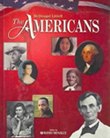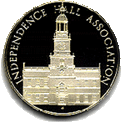American History Iby Matthew Caggia
- Unit 1A: Colonization & the 13 Colonies
- Unit 1B: Coming of the Revolution
- Unit 2A: Confederation & Compromise
- Unit 2B: The New Nation
- Unit 3: Sectionalism & Nationalism
- Unit 4: Reshaping the Nation
- Unit 5: Coming of the Civil War
- Unit 6: The Civil War
- Unit 7: Reconstruction
- Textbook
Unit 1B: The American Revolution
Chapter 3.4 - 4.2
The embodiment of the Enlightenment, the American Revolution brought monumental changes to the American colonies (now states), Europe, and the rest of the world. After the French and Indian War (an extension of the larger conflict, the Seven Years War) King George III and Parliament pressured the colonies to contribute more to the coffers of Great Britiain for the expense of the war and the defense of the 13 colonies. Accustomed to leniency (salutary neglect) the crown's new position on the colonies came as a surprise and they pushed back.
Study Tools
The French & Indian War
For my second video I tried to add a little bit of humor in a couple of places. Regardless, this video discusses the some of the lead up to the French & Indian War and the fact this was just one part of a global conflict between France & Britain. There will be a little about the events of the war, and a bit more about the outcome and effects of the war. Use these Guided Notes to organize the main ideas of the video.
Coming of the Revolution
The slideshows are best if viewed full screen. Brief chronicle of the events leading up to the American Revolution.
Enlightenment Thinkers
The slideshows are best if viewed full screen. The ideas that contribute to the new government of the US! John Locke, Charles Montesquieu, Jean-Jacques Rousseau. Natural Rights, the Social Contract, and Separation of Powers!
Online Textbook Resources
 |
"The Americans" TextbookThese pages contain the links to the online content for student practice. It includes Chapter Overviews, Web Activities, Self-Check Quizzes, ePuzzles and Games, Vocabulary Flashcards, Charts in Motion (to accompany diagrams in the textbook), and Interactive Graphic Organizers.
|
|
USHistory.org Free Online TextbookEach link is to the beginning of a chapter. There are several sections within each chapter; I would like to link to each section, however it becomes too cumbersome for the webpage. Instead, click "Next" on each page to get to the next section of the online textbook. | 
|
|
Vocabulary
Link to Quizlet! Vocabulary is the key to understanding any subject. Once you can break down the barrier of language the ideas and concepts are wide open. Here you can find the vocabulary for the unit to practice by using online flash cards and by practicing online generated vocabulary quizzes.
- Unit 1B Vocabulary Quiz on Quizlet
Practice your vocabulary for Unit 1A by trying this quiz of the unit's vocabulary.
When you get to the Quizlet Quiz page, you can adjust what type of quiz to take by using the check boxes on the right.
Videos!
Crash Course American History #5: The Seven Years War and the Great Awakening
From the publisher:
John Green teaches you about the beginnings of the American Revolution in a video titled The Seven Years War. Confusing? Maybe. John argues that the Seven Years War, which is often called the French and Indian War in the US, laid a lot of the groundwork for the Revolution. More confusing? Why does this war have two names? Why were the French and Indians fighting each other? The Seven Years war was actually a global war that went on for nine years. I think I'm having trouble making this clear. Anyway, the part of this global war that happened in North America was the French and Indian War. The French and Indian tribes were the force opposing the British, so that's the name that stuck. Let's get away from this war, as it makes my head hurt. Other stuff was going on in the colonies in the 18th century that primed the people for revolution. One was the Great Awakening. Religious revival was sweeping the country, introducing new ideas about religion and how it should be practiced. At the same time thinkers like John Locke were rethinking the relationship between rulers and the ruled. So in this highly charged atmosphere, you can just imagine what would happen if the crown started trying to exert more control over the colonies. The colonists would probably just rise up, right? We'll see what happens next week.
Crash Course American History #6: Taxes & Smuggling - Prelude to Revolution
From the publisher:
John Green teaches you about the roots of the American Revolution. The Revolution did not start on July 4, 1776. The Revolutionary War didn't start on July 4 either. (as you remember, I'm sure, the Revolution and the Revolutionary War are not the same thing) The shooting started on April 19, 1775, at Lexington and/or Concord, MA. Or the shooting started with the Boston Massacre on March 5, 1770. At least we can pin down the Declaration of Independence to July 4, 1776. Except that most of the signers didn't sign until August 2. The point is that the beginning of the Revolution is very complex and hard to pin down. John will lead you through the bramble of taxes, royal decrees, acts of parliament, colonial responses, and various congresses. We'll start with the end of the Seven Years War, and the bill that the British ran up fighting the war. This led to taxes on colonial trade, which led to colonists demanding representation, which led to revolution. It all seems very complicated, but Crash Course will get you through it in about 12 minutes.
Crash Course American History #7: Who Won the American Revolution?
From the publisher:
John Green teaches you about the American Revolution. And the Revolutionary War. I know we've labored the point here, but they weren't the same thing. In any case, John will teach you about the major battles of the war, and discuss the strategies on both sides. Everyone is familiar with how this war played out for the Founding Fathers; they got to become the Founding Fathers. But what did the revolution mean to the common people in the United States? For white, property-owning males, it was pretty sweet. They gained rights that were a definite step up from being British Colonial citizens. For everyone else, the short-term gains were not clear. Women's rights were unaffected, and slaves remained in slavery. As for poor white folks, they remained poor and disenfranchised. The reality is it took a long time for this whole democracy thing to get underway, and the principles of life, liberty, and the pursuit of happiness weren't immediately available to all these newly minted Americans.
Schoolhouse Rock! The Shot Heard Round the World
You can't miss with the classic Schoolhouse Rock! videos. This catchy, three-minute, video describes the Battles of Lexington & Concord and the Battle of Bunker Hill. Summing up the important events through the Battle of Yorktown is sure to help students remember a few key facts.
John Adams - Declaration of Independence
The most reliable source of information from the Second Continental Congress are from the correspondence between John Adams and his wife Abagail. This scene from the HBO mini-series "John Adams" demonstrates the importance and the seriousness of the decision to declare independence from Britain. You can see and feel the weight of each state's delegation when they vote in favor of independence. It is clear that the decision was not an easy and one, and one that cannot be undone.
A Powerful Performance
This is the first part of an excellent and brief documentary of the Declaration of Independence. Morgan Freeman introduces the document in this segment and briefly explains the global significance of this document.
The Declaration of Independence
This is the conclusion of the segment above. In this segment, the Declaration of Independence is narrated by famous contemporary actors. It is a powerful performance of this important document.
Schoolhouse Rock: Fireworks
More Schoolhouse Rock! Great and catchy jingle for the Declaration of Independence and the Revolutionary War. "The Declaration, of Independence, in seventeen-hundred and seventy-six..."
Too Late to Apologize A Declaration
Creative music video based on the song "Apologize" by One Republic. Here the founders are telling the King that it is too late to apologize for all that he had done to the colonies. It is time to declare independence.